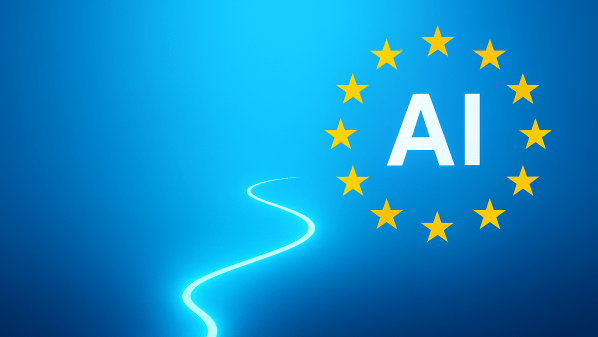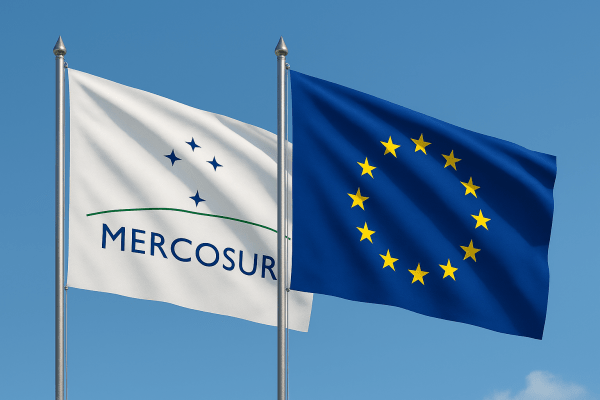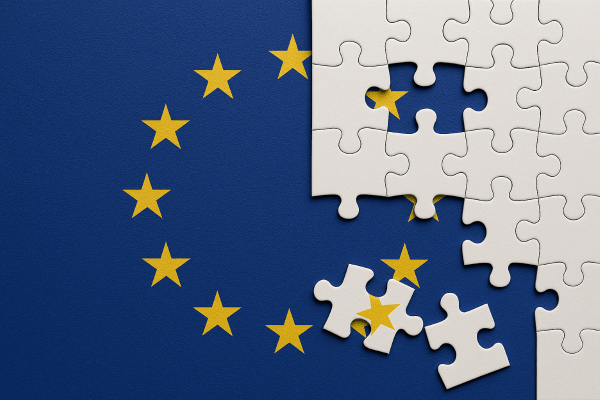On June 5, 2025, European Commissionner Henna Virkkunen and the High Representative for Foreign Affairs and Security Policy, Kaja Kallas presented the International Digital Strategy for the EU—a landmark Joint Communication that sets a comprehensive, outward-looking digital policy agenda. Although not legally binding, this Communication is a strategic signal, offering a roadmap to deepen the EU’s role as a global digital actor.
From connectivity and cybersecurity to technology, AI governance and digital trade, the strategy outlines a framework for partnerships, cooperation, and infrastructure development. As implementation efforts commence, Telefónica welcomes this initiative, which incorporates many of the proposals we put forward.
Digital Sovereignty and Global Cooperation: framing the strategy
Digital is defined as a core element of the EU’s external action. The EU strategy is built around three core pillars:
- Boosting EU tech competitiveness through international business cooperation and innovation.
- Enhancing security and resilience, especially for digital infrastructure and supply chains.
- Shaping global digital governance and standards in line with democratic values and human rights.
The strategy begins with the recognition that no country can tackle the digital and AI transformation alone. It emphasizes the convenience of trusted partnerships, regional alliances, and multilateral engagement as key enablers. It emphasizes that these agreements “set high-standard digital trade rules that ensure a secure and safe online environment for consumers, bring transparency, predictability and legal certainty for companies, and prevent or remove unjustified barriers to digital trade including for cross- border data flows”
The EU’s International Digital Strategy aims to expand its global network of digital partnerships to strengthen its geopolitical and technological leadership. The EU is engaging with regions including Latin America, Africa, Asia, and its neighbourhood to support secure infrastructure, policy alignment, and innovation. The strategy outlines four priorities: (1) deepening current partnerships with a stronger business role, (2) broadening cooperation through new agreements, (3) connecting partnerships into a coordinated global network, and (4) integrating digital dimensions into Security & Defence Partnerships, especially for dual-use technologies like AI and quantum.
It also highlights the role of investments and initiatives under the Global Gateway, particularly in enlargement and neighbourhood countries, as essential components of the EU’s external digital agenda.
To engage with a broader set of trusted partners, the EU will develop an integrated Tech Business Offer managed jointly by “Tech Team Europe”. Such a comprehensive Offer will support the deployment of secure and trusted connectivity, Digital Public Infrastructure, artificial intelligence and software solutions, and beyond.
Indeed, it is imperative for the EU to establish and strengthen strategic alliances with partner countries based on shared values and practical cooperation. This should include strengthening ties, for instance making greater use of the Global Gateway initiative (e.g. with Latin America) and fostering close and effective collaboration to combat cybercrime and fraud.
To achieve its goals, it is crucial to ensure increased involvement of key actors—especially businesses and civil society—in multilateral policy and standardisation bodies. Structured public-private collaboration, combined with better harmonisation between the EU’s external digital agenda and its broader industrial strategy, will bolster Europe’s influence on the global stage. On digital trade, we underscore the importance of proactively safeguarding European industrial interests—including in critical areas such as cybersecurity services—in a global market that is increasingly shaped by non-EU players.
Infrastructure and Connectivity: The Backbone of Digital Sovereignty
The strategy rightly places connectivity infrastructure—from 5G to undersea cables and satellite networks—at the heart of international digital cooperation. It identifies secure digital networks as enablers of everything from public services to innovation ecosystems.
The EU highlights key subsea cable projects, proposes new strategic routes, supports secure 5G deployment in partner countries by drawing on instruments such as the 5G Toolbox, and promotes the development of the LAC Connectivity Toolbox to address regional connectivity and infrastructure challenges.
Telefónica welcomes the EU’s recognition of strategic connectivity. However, we urge the Commission to formally acknowledge the European telecom sector as a critical digital and security enabler. Operators are not just service providers—they are industrial, security, and diplomatic assets.
Emerging technologies and standard setting: From AI to 5G/6G, semiconductors and quantum
The EU also intends to shape global AI norms through the Global Partnership, and through digital trade agreements. Additionally, it calls for cooperation with like-minded countries on developing standards for next-generation technologies such as 6G and quantum, while actively engaging on semiconductors with a clear focus on defending the EU’s economic security interests.
The EU aims to increase its presence in global standard-setting bodies and build high-standard digital trade agreements that ensure secure cross-border data flows, legal certainty, and alignment on digital rules. Key actions include strengthening European participation in ITU, ISO, and ETSI; promoting interoperable frameworks for data governance, e-signatures, and secure connectivity and expanding the network of digital trade chapters in free trade agreements.
Telefónica supports the EU’s multilateral approach and underscores the need for European industry-driven leadership in standards development, particularly in strategic technologies such as 5G, 6G, and quantum-safe networks. This includes the critical importance of funding private-sector participation in international standardisation efforts to ensure Europe’s voice is effectively represented.
Cybersecurity: A global Imperative
Cyber threats are increasingly cross-border, complex, and targeted at critical infrastructure. The EU strategy focuses on extending cyber dialogues with partner countries, promoting mutual recognition of cybersecurity standards, and enhancing cyber resilience through cooperation, capacity building, and regulatory convergence. It also highlights participation in multilateral forums and the opportunity to align efforts with the Cyber Resilience Act (CRA), leveraging it as a foundation for shaping international development of global cybersecurity standards
Telefónica agrees that cybersecurity and fraud prevention must be core priorities. The EU should focus on harmonising and simplifying cybersecurity regulations to reduce fragmentation across Member States and international partners. It is also essential to enhance real-time cyber threat intelligence sharing between governments and the private sector, and to support international anti-cybercrime efforts through dedicated task forces and targeted resources.
Digital Identity and Platforms
The strategy also touches on broader themes such as Digital identity interoperability (e.g. EU eID Wallet alignment with partners), Digital Public Infrastructure (DPI) and trust services and combatting online harms through alignment on platform regulation, child safety, and consumer protection. It proposes actions like interoperability pilots, mutual recognition of e-signatures, and events to promote the EU’s regulatory model abroad.
Telefónica agrees with the EU’s global leadership on trust services and DPI. We stress the importance of ensuring technical interoperability in identity services, promoting the use of open standards, and guaranteeing access to essential components of mobile operating systems so that a diverse range of stakeholders can develop and provide secure identity services. Fostering international dialogue and encouraging European digital tools are key to promoting trusted digital frameworks globally and strengthening Europe’s role in shaping an interoperable digital ecosystem.
Global digital governance
Through Digital Partnerships and Dialogues, the EU coordinates with partner countries and builds coalitions to influence key international forums such as the UN, G7, G20, OECD, Council of Europe, and global Internet governance bodies.
The EU supports the Global Digital Compact (GDC)—the first UN-led framework for global digital governance—committed to fostering an open, free, and secure digital future. The EU also recognizes the central role of ICANN in managing Internet infrastructure and will stay actively engaged in the GDC’s implementation.
The EU International Digital Strategy is the last and more complete step in the way that started with the inclusion of digital chapters in the free trade agreements and followed with the consecution of digital agreements with partners as the republic of Korea, or Singapore. The digital trade agreements demonstrate the EU’s commitment to being at the forefront of new digital developments, while upholding open digital economies that are competitive, transparent, fair, and free of unjustified barriers to international trade. The digital trade agreements aim to build consumer trust, ensure predictability and legal certainty for businesses, and remove and prevent the emergence of unjustified barriers to digital trade.
Final Reflections: From Roadmap to Results
The EU International Digital Strategy presents a timely and ambitious vision for Europe’s role in the global digital landscape. It embraces cooperation, values-based leadership, and strategic autonomy.
Telefónica strongly supports this direction—but calls for greater operational focus, deeper industry involvement, and measurable delivery frameworks.
As the EU prepares to present the strategy through high-level events and begins implementing key actions, telecom operators and digital service providers must be treated as co-creators, not just stakeholders.
Europe’s competitiveness, resilience, and digital sovereignty depend on it.











